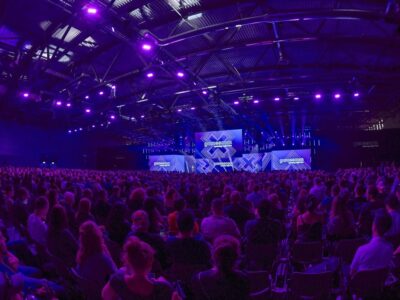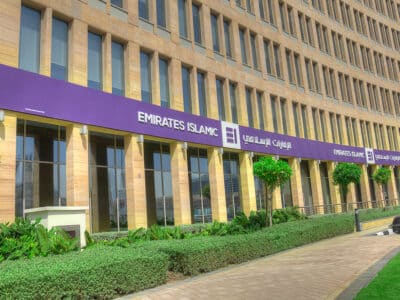MTV’s Nickelodeon is expanding its brand throughout the Gulf with a theme park and hotel already planned for the region. Arabian Business reports on the arrival of the world’s leading children’s entertainment channel.
The colourful, cartoon character-filled launch of Nickelodeon Arabia last week is only the beginning of Bhavneet Singh’s plans for the Middle East region.
The managing director of MTV Networks International Emerging Markets can’t wait to introduce the various brands within one of the company’s biggest businesses – Nickelodeon – to the region.
Everything at Nickelodeon Hotels is tailored to kids. Beds are lower, and there are splash rides, slime and characters all over.
MTV Networks has three different divisions: a youth portfolio, a kids and family group, and the entertainment group.
“The kids and family group is one of our biggest businesses across the world,” says Singh.
“We want to offer consumers here the ability to interface with any of the Nickelodeon offerings on any platform that they choose.”
Nickelodeon Arabia is MTV Network’s second channel launch in the region, following the MTV Arabia music channel last year.
The company is not alone in its appetite for viewers from the region.
This year saw an influx of international television and entertainment companies launching free-to-air channels and signing deals with local partners. Newcomers include Fox Movies as well as India’s hit entertainment channels NDTV and INX.
Alongside other emerging markets, the Middle East in general and the Gulf states in particular, have become a main attraction for TV and production companies as they look to cash in on the region’s accumulating petrodollars.
“A lot of economic growth, especially on the back of the petrodollar boom, is coming out of this region,” says Singh.But the profits have yet to materialise for Nickelodeon, which is eyeing a longer-term return on its investment.
“This region is one of the growth pillars in the next five or six years and it’s important that our brands are well-understood, well-distributed and well-represented in this region. If we invest well in these three areas we will more than recover and recoup our investment over a period of time,” says Singh.
Today, Nickelodeon is the world’s number one entertainment brand for kids, with 35 channels reaching approximately 200 million households in 135 countries. Singh hopes to extend the Nickelodeon brand across the Middle East.
We have a truly global product, but in the cultural context of the Middle East we will localise it by having Ramadan-specific shows, and culturally-aware content.
The company has already announced a Nickelodeon theme park in Dubai – to be completed in 2011 – and is planning to build the region’s first Nick Hotel “at some point” with a specific focus on the UAE.
“We are having conversations with different groups here talking about how and when we take up some of those offerings.”
Managed by Marriott International, 20 Nick hotels are planned across the world by 2020. The hotels will be developed through collaboration between Nickelodeon, Marriott International, and Miller Global Properties.
Miller Global will have exclusive rights to develop and own the resorts in specified geographic areas, and plans to seed an investment fund that is expected to initially provide $300m of dedicated development equity capital.
The first hotel is expected to open in early 2010 in San Diego, USA. Other locations currently under consideration for development include key family-oriented destinations in the US, Caribbean and Mexican resort areas, UK and Europe, Asia, Australia and the Middle East.
The hotels are built to cater for children and families, but also to attract younger adults, and business people travelling with families.
“Nickelodeon Hotels is a bespoke concept that is made from scratch for kids. Everything there is tailored to kids. You have rooms that have two different rooms, beds are lower, and there are splash rides, slime and characters all over.
“Wherever we’ve done the hotels, the inflow of traffic has gone up tremendously,” says Singh, adding that there have been a lot of enquiries from the region regarding the project.The Nickelodeon brand seems to have already amassed a fan base in the region, even with very limited exposure.
In addition to its TV channel and potential hotel in the UAE, Singh hopes to replicate the brand’s theme rides in Mall of America in the US.
Majid Al Futtaim Group, developer of Mall of the Emirates and Deira City Centre in Dubai, as well as Muscat City Centre in Oman, could be a possible partner. Talks are being held with potential partners, but no deals have been finalised yet.
“Mall of America is a huge shopping destination and the focal point of the mall is the Nickelodeon rides. That’s what we’ll do when the right opportunity comes in Dubai. We don’t want to replace Ski Dubai but there will be something bigger and better coming along,” says Singh, adding that the company has been approached by a number of interested parties.
Nickelodeon’s recreation team is already conducting research in the market to determine retail numbers and whether the opportunity is there.
“It is in the pre-preparation stage right now, sizing the opportunity, looking at who we want to partner with, and what kind of rides we can get,” says Singh.
On the animation side of the business, Singh envisions taking a regional cartoon character to a global audience.
“My dream would be to take an animation character like Freej, which was very successful, and take it across Arabia and other markets. Nick India, Nick Indonesia, even Nick Europe could air it. I’d love to do that if we can and I don’t see any reason why we can’t,” says Singh.
Singh was impressed with screenings of Arabic films after attending an event held in association with the Dubai International Film Festival, alongside Abdul Hamid Juma, head of TECOM Authority.
“The quality of stuff you see is as good as any. People just have this preconceived notion that what comes out of here is not necessarily that good. I think that’s changed a lot and I want to be able to use Nickelodeon as a platform to showcase that.”The company’s content and creative team is collaborating with the Arab Media Group to bring in the “values and ethos” of the Nickelodeon brand and make sure the local team understands how it works.
“My creative and content team’s job is to make sure that the local team bleeds orange, as I call it.
The minute they start to do that there’s very little difference between being a local and international team,” says Singh.
He adds: “I’d like them to work together on a pilot project to figure out how we can bring together an animation or a live action series from the region and take it out.”
Singh plans to bring two or three additional Nickelodeon brands to the regional broadcast market, and introduce the same on the internet. He believes it has become difficult to engage with kids today, even with a strong entertainment offering, without internet or mobile.
Singh hopes to see more channel launches, wider brand offering and more staff in the region. At present, he is working on getting a better understanding of the region’s kids’ space.
“It’s very easy to say we are Nickelodeon but there’s a lot more family-viewing here; it needs to be approved by the parents which we need to be sensitive to.”
Nickelodeon’s strategy, explains Singh, is to enter markets with channels that start with predominantly international content and then grow increasingly local.
“Most of Nickelodeon’s characters, such as Dora or Spongebob, travel extremely well,” he says, adding that research showed that people in Spain, India, America and other locations where the channel is aired, perceive the channel as being local.
“This is one of the selling points of Nickelodeon, that we have a truly global product. In the cultural context of the Middle East we will localise it by having Ramadan-specific programming, and culturally-aware content.”Singh would like to see a future version of Nickelodeon Arabia in the shape of specific versions for different Arab countries.
As markets mature and develop, consumers will demand more local content, he explains.
Additionally, Singh wants to bring to the region its own version of the Kids Choice Awards, Nickelodeon’s biggest annual show featuring Hollywood celebrities and top artists including Justin Timberlake, Will Smith and Nicole Kidman.
“It’s a place where kids represent who they think was the best actor or actress. We do international variations of this show. We’ve done one in the UK, and in Germany. I’d like to have the Nickelodeon kids show awards for Arabia by next year,” says Singh.
Singh has grand ambitions where he foresees a channel launch in the region every year to tap into 36 million households. But it’s not all fun and games. Singh is also keen to investigate possibilities of projects related to education in the region.
The Gulf’s booming retail industry has also caught his attention. Saudi Arabia is a particular draw, where the company has seen “exceptionally good ratings” for its MTV Arabia channel. Singh wants to see more than just a Nickelodeon Saudi channel in the future.
“I’d like to have a Nickelodeon store in the Saudi market to sell consumer products,” says Singh. Brands such as Spongebob and Dora are largely successful from a retail standpoint, he notes.
“Our retail and consumer team is looking at how and when we can set up a retail infrastructure to do merchandising of some of those products. That requires a huge amount of logistics to figure out how you source the product and merchandise it, but I believe there’s a tremendous opportunity,” says Singh. All of his plans, however, hinge on the performance of Nickelodeon Arabia TV channel, which started airing last week.
“Everything depends on exposure and how well the channel does. The more successful we are with the channel the faster and bigger the roll out for all our associated products will be.”
RELATED LINKS:The rise of brand Bollywood, Hooray for Hollywood







